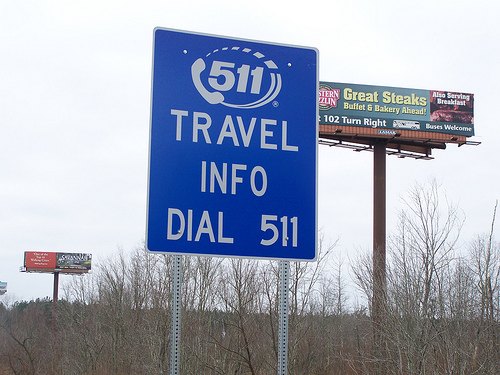FHWA To Spend $1.2b To Federalize Traffic Reports
The Federal Highway Administration (FHWA) will issue a final rule next month that will force states to spend an estimated $1.2 billion to implement the “511” traffic information hotline championed by former Vice President Al Gore. So far, thirty-two states have established telephone numbers that provide callers with pre-recorded traffic updates. The rule will standardize the data formats and required features that will apply to all the states, beginning with coverage in the top-fifty metropolitan areas.
Beyond 511, the new federal rule will force states to offer real-time traffic information already being provided by a number of companies including Google, Yahoo!, Clear Channel, Westwood One and Navteq. These firms distribute high-quality traffic information to the Internet, 2400 radio stations, 170 television stations and countless GPS units and mobile phones throughout the country.
In 1999, Gore envisioned the nationwide, government-funded telephone number that would provide traffic conditions under the theory that when motorists know about jams, excess traffic can divert to side streets and other routes. The proposal was enacted as part of the Clinton Administration’s “livable communities” initiative at a time before states began outlawing the use of cell phones while driving. A November investigation by the Government Accountability Office (GAO) determined that full implementation of the traffic information plan is likely to cost a great deal of money.
“Most state and local government officials that we interviewed cited challenges in implementing the program within the specified time frames and said that the program would be difficult to implement without additional funds,” the GAO report explained. “Because some states and local governments are facing budget constraints, the implementation of a real-time information program may not be a priority.”
Some state and local highway agencies have complained that FHWA’s rule takes a one-size-fits-all approach. California’s transportation officials, for instance, are upset at being forced to provide “roadway weather information” in temperate regions where the weather is rarely, if ever, a factor in commutes. Kansas was likewise irritated by requirements to collect data on far-flung, sparsely traveled rural roads. GAO reviewed twenty studies advocating Intelligent Transportation System (ITS) programs that included a real-time information component. GAO found them highly biased, overstating “congestion reduction” benefits.
“Few of the studies we reviewed found negative impacts associated with these systems,” GAO concluded. “One study, however, found that traveler information systems that recommend alternative routes (such as dynamic message signs) may, in some cases, cause congestion on these alternative routes. As a result, a traveler may not experience the intended travel time reduction.”
Because the US Department of Transportation has made it a priority to spend gas tax money on programs unrelated to road construction, the real-time traffic information program is expected to receive significant subsidy from federal gas tax funds.
A copy of the GAO report is available in a 1.9mb PDF at the source link below.
Efforts to Address Highway Congestion through Real-Time Traffic Information Systems (US Government Accountability Office, 11/30/2009)
More by The Newspaper
Latest Car Reviews
Read moreLatest Product Reviews
Read moreRecent Comments
- MaintenanceCosts The crossover is now just "the car," part 261.
- SCE to AUX I'm shocked, but the numbers tell the story.
- SCE to AUX "If those numbers don’t bother you"Not to mention the depreciation. But it's a sweet ride.
- Shipwright Great news for those down south. But will it remove internal heat to the outside / reduce solar heat during cold winter months making it harder to keep the interior warm.
- Analoggrotto Hyundai is the greatest automotive innovator of the modern era, you can take my word for it.


































Comments
Join the conversation
Why not spend the same money on standardizing electronic alerts and distribution? While we're at it, let's turn the red-light/speed cameras as data collectors instead? (puts on his tinfoil hat and hides in the corner before the men in white coats come to take him away for talking nonsense)
There's definitely a role for gov't to play here, but I'm not sure this is being well-executed. After all, the only reason that those private companies are able to deliver solutions today is that the U.S. gov't/military invested in the GPS and Internet systems decades ago. Perhaps they should learn from those experiences and simply invest in the infrastructure, open up the interfaces and then step-back and watch private industry put together solutions that work.